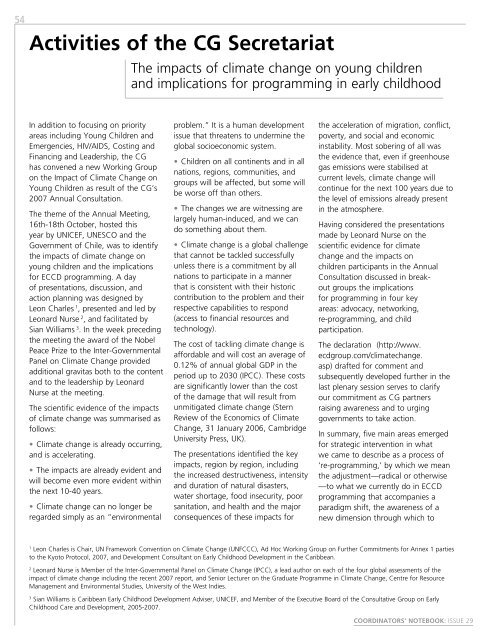A global call to action for early childhood
A global call to action for early childhood
A global call to action for early childhood
Create successful ePaper yourself
Turn your PDF publications into a flip-book with our unique Google optimized e-Paper software.
54<br />
Activities of the CG Secretariat<br />
The impacts of climate change on young children<br />
and implications <strong>for</strong> programming in <strong>early</strong> <strong>childhood</strong><br />
In addition <strong>to</strong> focusing on priority<br />
areas including young children and<br />
Emergencies, HIV/AIDS, Costing and<br />
Financing and Leadership, the CG<br />
has convened a new Working Group<br />
on the Impact of Climate Change on<br />
Young Children as result of the CG’s<br />
2007 Annual Consultation.<br />
The theme of the Annual Meeting,<br />
16th-18th Oc<strong>to</strong>ber, hosted this<br />
year by UNICEF, UNESCO and the<br />
Government of Chile, was <strong>to</strong> identify<br />
the impacts of climate change on<br />
young children and the implications<br />
<strong>for</strong> ECCD programming. A day<br />
of presentations, discussion, and<br />
<strong>action</strong> planning was designed by<br />
Leon Charles 1 , presented and led by<br />
Leonard Nurse 2 , and facilitated by<br />
Sian Williams 3 . In the week preceding<br />
the meeting the award of the Nobel<br />
Peace Prize <strong>to</strong> the Inter-Governmental<br />
Panel on Climate Change provided<br />
additional gravitas both <strong>to</strong> the content<br />
and <strong>to</strong> the leadership by Leonard<br />
Nurse at the meeting.<br />
The scientific evidence of the impacts<br />
of climate change was summarised as<br />
follows:<br />
• Climate change is already occurring,<br />
and is accelerating.<br />
• The impacts are already evident and<br />
will become even more evident within<br />
the next 10-40 years.<br />
• Climate change can no longer be<br />
regarded simply as an “environmental<br />
problem.” It is a human development<br />
issue that threatens <strong>to</strong> undermine the<br />
<strong>global</strong> socioeconomic system.<br />
• Children on all continents and in all<br />
nations, regions, communities, and<br />
groups will be affected, but some will<br />
be worse off than others.<br />
• The changes we are witnessing are<br />
largely human-induced, and we can<br />
do something about them.<br />
• Climate change is a <strong>global</strong> challenge<br />
that cannot be tackled successfully<br />
unless there is a commitment by all<br />
nations <strong>to</strong> participate in a manner<br />
that is consistent with their his<strong>to</strong>ric<br />
contribution <strong>to</strong> the problem and their<br />
respective capabilities <strong>to</strong> respond<br />
(access <strong>to</strong> financial resources and<br />
technology).<br />
The cost of tackling climate change is<br />
af<strong>for</strong>dable and will cost an average of<br />
0.12% of annual <strong>global</strong> GDP in the<br />
period up <strong>to</strong> 2030 (IPCC). These costs<br />
are significantly lower than the cost<br />
of the damage that will result from<br />
unmitigated climate change (Stern<br />
Review of the Economics of Climate<br />
Change, 31 January 2006, Cambridge<br />
University Press, UK).<br />
The presentations identified the key<br />
impacts, region by region, including<br />
the increased destructiveness, intensity<br />
and duration of natural disasters,<br />
water shortage, food insecurity, poor<br />
sanitation, and health and the major<br />
consequences of these impacts <strong>for</strong><br />
the acceleration of migration, conflict,<br />
poverty, and social and economic<br />
instability. Most sobering of all was<br />
the evidence that, even if greenhouse<br />
gas emissions were stabilised at<br />
current levels, climate change will<br />
continue <strong>for</strong> the next 100 years due <strong>to</strong><br />
the level of emissions already present<br />
in the atmosphere.<br />
Having considered the presentations<br />
made by Leonard Nurse on the<br />
scientific evidence <strong>for</strong> climate<br />
change and the impacts on<br />
children participants in the Annual<br />
Consultation discussed in breakout<br />
groups the implications<br />
<strong>for</strong> programming in four key<br />
areas: advocacy, networking,<br />
re-programming, and child<br />
participation.<br />
The declaration (http://www.<br />
ecdgroup.com/climatechange.<br />
asp) drafted <strong>for</strong> comment and<br />
subsequently developed further in the<br />
last plenary session serves <strong>to</strong> clarify<br />
our commitment as CG partners<br />
raising awareness and <strong>to</strong> urging<br />
governments <strong>to</strong> take <strong>action</strong>.<br />
In summary, five main areas emerged<br />
<strong>for</strong> strategic intervention in what<br />
we came <strong>to</strong> describe as a process of<br />
‘re-programming,’ by which we mean<br />
the adjustment—radical or otherwise<br />
—<strong>to</strong> what we currently do in ECCD<br />
programming that accompanies a<br />
paradigm shift, the awareness of a<br />
new dimension through which <strong>to</strong><br />
1<br />
Leon Charles is Chair, UN Framework Convention on Climate Change (UNFCCC), Ad Hoc Working Group on Further Commitments <strong>for</strong> Annex 1 parties<br />
<strong>to</strong> the Kyo<strong>to</strong> Pro<strong>to</strong>col, 2007, and Development Consultant on Early Childhood Development in the Caribbean.<br />
2<br />
Leonard Nurse is Member of the Inter-Governmental Panel on Climate Change (IPCC), a lead author on each of the four <strong>global</strong> assessments of the<br />
impact of climate change including the recent 2007 report, and Senior Lecturer on the Graduate Programme in Climate Change, Centre <strong>for</strong> Resource<br />
Management and Environmental Studies, University of the West Indies.<br />
3<br />
Sian Williams is Caribbean Early Childhood Development Adviser, UNICEF, and Member of the Executive Board of the Consultative Group on Early<br />
Childhood Care and Development, 2005-2007.<br />
COORDINATORS’ NOTEBOOK: ISSUE 29
















